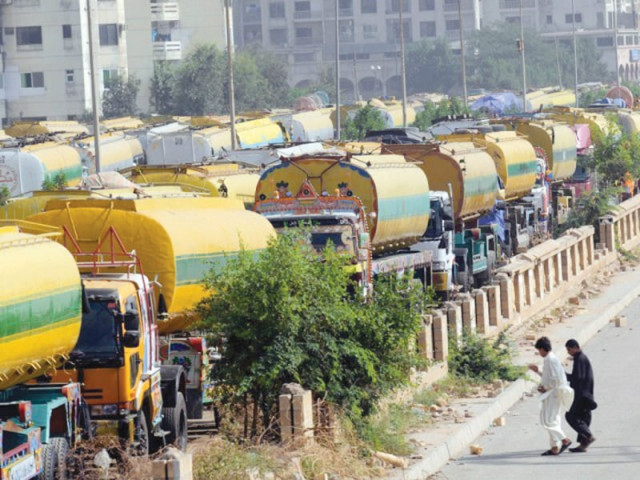Brace yourself: Water goes scarce as tanker mafia takes over supply chain
One of the two sources of Karachi’s water, Hub Dam, is still at ‘dead’ level.

Brace yourself: Water goes scarce as tanker mafia takes over supply chain
The city must brace for a major water crisis over the next few months unless there is ample rainfall to top-up the water reserves at Hub Dam.
As residents of several areas take to the streets to protest the water shortages in their respective areas, officials of the Karachi Water and Sewerage Board (KWSB) are left scratching their heads, praying desperately for a miracle to avert the crisis.
Currently, the city is facing a shortage of 150 million gallons per day (MGD) against the demand of 650MGD. The shortage is largely being attributed to the drought at Hub Dam.
The shortage, however, seems to be a farce considering the fact that the KWSB admits that around 30% to 35% of the water is stolen or leaks through the cracked pipelines.
Sources
Karachi's two primary sources of fresh water are Hub Dam and Keenjhar Lake. The former gets its supply from the water channels formed on the mountains whenever it rains; the latter gets its supply from River Indus. Every year, monsoon rains provide enough water to fill the dam to capacity. This water usually lasts until the rainy season the following year. The KWSB gets around 550MGD from Keenjhar Lake and approximately 100MGD from Hub Dam.
Last year, however, the rainfall was a lot less than average and the dam could not get its usual supply. Thus, the effects of the low rainfall are being felt by the residents.
According to the KWSB, Orangi, Surjani Town, New Karachi, North Karachi, Shershah and Baldia Town are supplied water from Hub Dam, while the rest of Karachi is supplied water from Keenjhar Lake.
The KWSB operates 16 water hydrants across the city. These are supplied an average of around 30,000 gallons per day and residents can pay the KWSB to supply tankers to their houses on official rates from these hydrants. In addition to these, 129 illegal water hydrants are also being run by individuals.
Enter the mafia
For those who can afford it, the 'tanker mafia' supply water at a rate of Rs3,000 per day. These tankers get their water from the illegal hydrants and supply it to households at prime rates. Such is the demand for water that the business has become a lucrative source of income for the owners in a short period of time.
For their part, the KWSB has repeatedly made of show of taking action against these illegal hydrants. Ironically, however, more seem to crop up each time.
The Express Tribune repeatedly tried to establish contact with the KWSB chairperson Qutubuddin Sheikh but he did not respond to any of the messages or calls. At the same time, however, the board's spokesperson issued a press release commending their action against an illegal hydrant on Korangi Road.
"The board has been carrying out its operation against illegal water hydrants since the last two years," said a resident, Mehtab Ali. "I don't understand how they are still operating in the city."
The solution
According to Prof Noman Ahmed, the chairperson of the urban infrastructure and planning department at NED University, the water crisis will resolve itself only if the government takes active steps against the illegal tanker mafia.
Prof Ahmed added that it was due to ill-planned urban infrastructure that most of the city could not get potable water and therefore, has to rely on illegal means to fulfill their needs. "This is the basic truth: the water tanker mafia is growing every part of the city and all politicians and stakeholders and filling their pockets instead of attempting to curb the menace," he said.
Gulshan-e-Hadeed residents protest
Hundreds of residents of Gulshan-e-Hadeed and Steel Town blocked the main National Highway for several hours to protest the shortage of water on Tuesday.
The population of Gulshan-e-Hadeed and Steel Town is around 300,000 and they have been deprived of water for over two months now. "The residents have blocked the main highway several times to protest the shortage of water but authorities have yet to take any steps to address the problem," a local journalist, Muhammad Waheed, told The Express Tribune. He said that the residents protested against the administration of the Karachi Water and Sewerage Board (KWSB) for two consecutive days but while the KWSB authorities did register cases against them over an attack on one of their installations, nothing has been done regarding the shortage itself.
According to Waheed, the rift between the KWSB and Pakistan Steel Mill is to blame for the shortage. Since Pakistan Steel Mill is a bulk costumer, the KWSB is not directly responsible for providing water to Gulshan-e-Hadeed and Steel Town. The claim was also endorsed by KWSB vice chairperson Sajid Jokhio, according to a press release issued by the KWSB. Jhokio said that the protest against the KWSB was useless since it was not responsible for supplying water to the area. "KWSB did not register the cases against protesters as it is the internal issue of the Pakistan Steel Mill," he clarified. "We have a conflict with the KWSB, since they supply water and we are their bulk customer," said Pakistan Steel Mill spokesperson Hafeez Shah. "Due to an electricity crisis in the pumping stations of KWSB, the water supply is not smooth to our reservoir and the residents of Gulshan-e-Hadeed, like those of any other locality in the city, are facing an acute shortage of water." "We cannot stop water supply to the production workshops so we have to stop supply to the residential areas," he said.
Published in The Express Tribune, August 6th, 2014.



















COMMENTS
Comments are moderated and generally will be posted if they are on-topic and not abusive.
For more information, please see our Comments FAQ